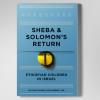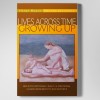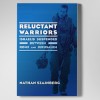1. What’s a Reluctant Warrior?
1. I write about elite soldiers, all of whom chose after obligatory service to return to civilian life, as do most of Israeli soldiers. Israel is a democracy in which ninety percent of boys and seventy percent of girls serve in the army — three to four years for boys; two for girls. They do this after high school; college comes later. Based on a complex system of scoring (physical, academic, background, emotional and cognitive testing), recruits are given a score — called a Kaba. The men in this book received the highest Kaba. Ironically, in Israel, those with the highest scores strive to be in the toughest, often dangerous combat units. Unlike in the US army,officer training comes only after basic training and service; everyone enters as foot soldier.
I call them Reluctant Warriors, as I was struck with the contrast between their military competence and their inner reluctance to have soldierly identities. These men wanted to be husbands, sons, fathers, teachers, professionals, not soldiers. Yet, they served and served well.
2. Why write Reluctant Warriors?
I finished a thirty-year American study of development from infancy to adulthood, Lives Across Time. I was intrigued by the transition from adolescence to young adulthood. At a Hannuka party, I met a thirty-year-old Israeli graduate student who was in the US on a prestigious fellowship. He was older than many of his fellow grad students. He asked about my US study, then remarked that their lives until eighteen sounded not too different than his. But after eighteen, he said there was a watershed, a Continental Divide, between American and Israeli youth. He said a bit cryptically, “Whoever doesn’t understand the Army, doesn’t understand Israel.” I recall thinking right then: I don’t know about the Army; I want to learn about Israel. This set me on a six-year voyage into the lives of these warriors.
3. How did you do this study?
Well, for four years, I made twenty-four trips to Israel, each 2-3 weeks. I had read the major books on Israeli soldiers and also met with two authors, Amia Lieblich at the Hebrew University and Reuven Gal, formerly chief psychologist of the Army. I also met with retired generals and decided to study those soldiers who were in face-to-face combat units after they had completed their army service. I chose to do this study outside of the Army organization, so that there would be no restrictions. As a psychoanalyst, I am interested in inner landscapes: what makes a person who he or she is. I focus on the person’s child development to learn about how they became elite soldiers, on their seminal, critical experiences in the army, on their losses and the four to six years post army to learn how their service affected them. But, they also affected their society.
In my fifth year, I realized that I needed to move to Israel to complete the interviews and the book. I met with these men over several years, meeting where they chose: in Kibbutz guardhouses at midnight, in cafes near the Universities, at the border checkpoint of Jenin, near the Lebanon border during the war.
The “how” of my interviews is central. Before these men agreed to talk with me at length, they wanted to meet, to chat, to go for long walks, to check me out. They were recruited by other soldiers in my study and were motivated to be certain that I got the “truth” about their experiences. I was impressed that most had not discussed their experiences with anyone, except a close friend and sometimes their wives. I also was impressed that they did not want to regal me with battle tales; they yearned to talk about buddies or relatives who had been killed or how their inner lives were sculpted by their experiences.
Then War:
When I thought I had enough information from six years of interviews, the Second Lebanese War erupted. Several of my soldiers called me, wanting to talk about their experiences in Lebanon. I felt obligated to include these.
4. Were there any frightening or dicey experiences?
Hard to answer. For the Israelis, some experiences have become almost mundane, every day.
I had a couple experiences that helped me understand the sense of chronic tension of life in Israel even between wars. I write about some of these in the introduction. I hailed a cab on a Jerusalem street to go to the University, which is poised on a visible hill. I’d been there several times and knew the route. This cab took me through the Arab sector, then into some neighborhood in a valley I did not recognize; I could no longer see the University Hill. The cab drive — Arab, I now noticed — pulled over with the engine idling. When I said that I couldn’t see the University, he turned to me and said I would see it soon enough. I pulled out my phone to dial a friend. When he saw this, he shifted into gear; shortly we passed an Israeli checkpoint and I realized that he had taken me outside the city limits.
On another occasion, I was to interview a soldier in Gush Etzion, which is in the West Bank. I took the usual armored civilian bus, its front windshield covered with turkey wire to protect from thrown rocks, its side plexiglass windows scarred from missiles. The driver would open his side door at junctions, since he couldn’t see through the side glass to look for oncoming traffic. We had to turn back as there were fires in the road and rocks being thrown. I rescheduled that interview, but the soldier missed the next one, as he had been shot in the thigh while on reserve duty. We met on the third interview.
During the Lebanese War, I rented a Hyundai Getz to drive up north both the volunteer at the Kiryat Shemona Emergency Room and to talk with some of the men in my book. Approaching the town, I first heard the rockets land and felt the car trembling before I saw the rockets, then the scorched Benjamin Hills. Entering the town, I saw burnt-out hulks of cars in the town and realized that the tin can I was driving offered little protection. One boy whom I visited at his home because he was terrified, gave me a gift of shrapnel he had found in his backyard. I have them on my desk.
5. Any surprises over the years?
Surprises sometimes came from those who heard about the soldiers or read parts of the manuscript. One father who had helped recruit some of the soldiers, was surprised at how honest and candid these men were. He had expected that they would not be so revealing. One female officer whom I had interviewed early on, remarked that she thought these men had revealed too much, that they should have “sucked it up,” rather than talk about their hurt and sadness over their losses. At a major US university, one reflective psychiatrist, an Iranian woman, was impressed that these boys expressed no hatred. I was surprised at her comment, as I had been accustomed to these men talking without hatred.
Surprises for me? The degree of deep thoughtfullness, the level of complexity these men saw in their society and lives. I suppose I shouldn’t have been surprised by this, but I was certainly impressed. Also, I write about courage in my last chapter, as these men spoke about rare acts of courage in ways that no one had written about before, except for an ancient Chinese philosopher.
Besides surprise, there more moments of quiet shock. I begin one chapter with a soldier/medic shooting a sniper, the soldier’s first kill. The medic falls to the ground with mixed confusion, fear and excitement, asking himself, “What am I, a medic, a soldier, a Jew?” He has a crisis of identity. Only then does he let himself realize (as I do) that he “saw” the sniper in a tree from the glint of the sniper’s gun sight: he realizes that the sniper was aiming for him.
6. What was your most memorable experience?
So many. One soldier agreed to talk with me if I went on midnight guard tour of the periphery of his kibbutz in the West Bank. A woman had been shot to death some months earlier as she was walking along the kibbutz fence, so the kibbutz had regular night rounds with a jeep to check that no one had cut through the fence, that the electronic security systems were intact. As we bumped along the rocky route, the thickened night illuminated by the flood lights atop the Jeep, the soldier chatted. He stopped abruptly, looking into the darkness beyond the fence and pointed quietly. I saw nothing, nothing but night. As he aimed the floods, he then identified a feral dog or wolf slinking along the fence. I still saw nothing. He resumed driving and chatting.
But, it was the stories that are most memorable. I ask about courage of a now-middle-aged professor, highly decorated as a soldier, his legs so full of shrapnel that he cannot get through airport detectors. He responds, “Courage? Someone who has shit in his pants under fire.”
Another soldier whom I’ll call Ayal, on a final training with a buddy tells of being dropped at night by helicopter and needing to rendevouz. His buddies knee is shattered as he jumped from the ‘chopper. He insists that Ayal continue without him. Instead, Ayal dumps their backpacks and puts his buddy over his shoulders to complete the mission.
And, one soldier, Eliaz, who becomes an editor and poet, grew up in a mixed Arab-Jewish village. His best friends were twin Arab boys. When Eliaz is on guard duty outside Tulqarm after the Passover bombing in Netanya, he sees suspicious activity as teen-age boys and girls carry tubes with Rocket Propelled Grenade launchers within. Eliaz’s gunner asks for permission to shoot above their heads to scatter them. Eliaz hesitates, jeapordizing his unit and others, as he “sees” his twin Arab buddies before him.
There is much more that tells of the hearts and souls of these men.
7. What do you hope people will take away from this book?
First, to hear the men’s stories and their wish we remember those who were killed.
But, I think that most readers will want to know these men. They are upright, responsible, thoughtful, the kind of person whom you might want as a neighbor.
Further, I hope that readers will think about the implications of having conscript military service in a democratic society. George Washington thought it was robust for democracy to have its citizens serve in the army. Imagine what decisions we would make — and our representatives — if our children (and our Senators’ and Congresspersons’ children) served in the military. I don’t argue that this is a better system; I suspect that most military commanders prefer a professional, volunteer army. Rather, that we open the discussion as should be in a democracy.
If we listen to these men and to ourselves, it will only benefit our society.



